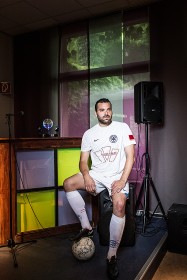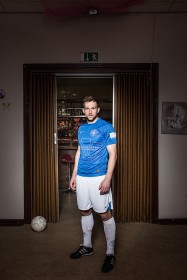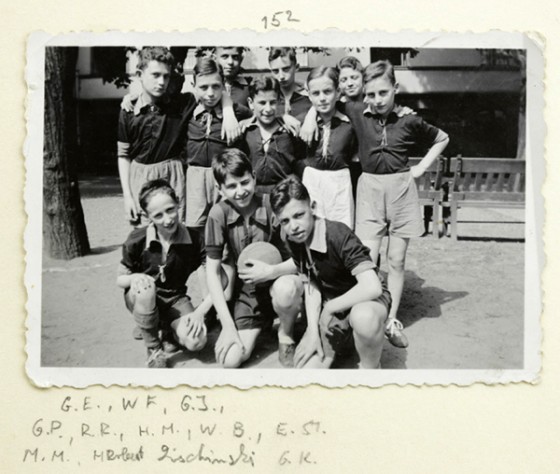The 14th European Maccabi Games (EMG) are taking place in Berlin from 27 July until 5 August 2015. More than 2,000 Jewish athletes from 36 countries will compete in 19 sports from football to fencing to chess. To accompany the games Tamar Lewinsky and Theresia Ziehe are producing a series of portraits with interviews, introducing a new member of the German delegation from Berlin every day here on the blog. They conducted the interviews on the grounds of the TuS Maccabi in Berlin’s Grunewald where Stephan Pramme also shot the portraits.
Ben Lesegeld (28), soccer
Ben, what role does it play for you that a part of the European Maccabi Games will be held at Berlin’s 1936 Olympic park?

Ben (28) soccer © Jewish Museum Berlin, photo: Stephan Pramme
On the one hand, it’s very special for me as an athlete, because the Olympic compound offers us a completely professional setting. On the other hand, it gives me a queasy feeling. The architecture of the Olympic Stadium always leaves me a little bit awestruck. For me, it’s not simply a “wonderful setting” though, because the stadium always reminds one of the history. So it’s not that simple to participate in an athletic event there with ease, joy, and pleasure. For me personally, it’s important to think about the people who weren’t allowed to take part back then. But I still find it good that the Maccabi Games are happening there. It shows that life must go on: we know exactly what happened there, but we keep going, we take part in a sporting event – despite this history – and we show that the future will be an open one.
What requirements must one fulfill – aside from athletics – in order to participate? → continue reading
The 14th European Maccabi Games (EMG) are beginning tomorrow, 27 July 2015, in Berlin. More than 2,000 Jewish athletes from 36 countries will compete in 19 sports from football to fencing to chess. To accompany the games Tamar Lewinsky and Theresia Ziehe are producing a series of portraits with interviews, introducing a new member of the German delegation from Berlin every day here on the blog. They conducted the interviews on the grounds of the TuS Maccabi in Berlin’s Grunewald where Stephan Pramme also shot the portraits.
Alec-Ilya Pivalov (28), soccer

Alec-Ilya (28), soccer © Jewish Museum Berlin, photo: Stephan Pramme
Alec, why are you taking part in the European Maccabi Games?
It’s a terrific athletic event where you can meet a lot of interesting people from many different countries. By now there’s also a familial atmosphere in the German delegation so it’s just really nice to have the opportunity to participate. And of course it makes you and your family proud.
In 1936, Jewish athletes weren’t permitted to participate in the Olympic Games. Does the fact that some of the competitive events will take place in Berlin’s Olympic grounds – which were built for that Olympics – play a personal role for you?
There is an ambivalence because of course I know the history of this stadium. But in the meantime I associate it with other events: → continue reading
This evening a game between the Israeli and Norwegian teams will kick off the Under-21 European Football Championship in Netanya. Participating in the opening match in their home country will be something very special for the Israeli players.
Since I am a big soccer fan, this European Cup provided me with the impetus to take a closer look at what the Jewish Museum’s collection has on the subject of soccer. In our online display I discover a “Short History of Jewish Football,” and in our collection data bank I find further objects that awaken my curiosity. A photograph from the year 1936 or 1937 particularly appeals to me. I find it fascinating that soccer was already in the 1930s something boys loved to play. In the picture stands (last row, center) the young Walter Frankenstein, born in 1924, together with his soccer team:

The soccer team of Auerbach’s Orphanage from 1936 or 1937. Gift of Walter Frankenstein (last row, center). Photographer unknown.
© Jewish Museum Berlin, photo: Jens Ziehe
All the boys in the picture were inhabitants at that time of Auerbach’s Orphanage in Berlin’s Schönhauser Allee. → continue reading


